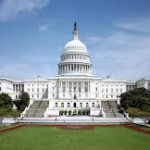 Our federal government has ground to a halt. Again. Republicans and Democrats were unable to meet a deadline to fund the government Monday night. While a group of “combative” Republicans are largely bearing responsibility for the impasse in Congress due to their hawkish advocacy to defund the Affordable Care Act, the reality is the factions in Congress are more varied and deeply divided than ever.
Our federal government has ground to a halt. Again. Republicans and Democrats were unable to meet a deadline to fund the government Monday night. While a group of “combative” Republicans are largely bearing responsibility for the impasse in Congress due to their hawkish advocacy to defund the Affordable Care Act, the reality is the factions in Congress are more varied and deeply divided than ever.
Both parties are to blame for this stalemate, and the result may very well be an ever-divided Congress where each party will blame the other for their unwillingness to negotiate. On the one hand, Republicans are claiming they want to reign in spending but are unwilling to compromise when it comes to military budgets and spending on our overseas police power – a capacity that is becoming increasingly disfavored by the public. And, indeed, the Department of Defense is, by far, the largest contingent that will be affected by the shutdown. On the other hand, Democrats spearheaded a bill that is not feasible to fund given the current economic crisis because the government is strictly not generating enough revenue to support such a program short of spending our future away.
Our government’s sole focus right now should be on economic improvement. While the Affordable Care Act promotes a noble purpose, the fact of the matter is that our government cannot afford to pay for it. Our federal programs, such as Social Security, are already failing for lack of funding and mismanagement. There is little support for the idea that the Affordable Care Act would face any more promising future.
Economic improvement will come from taking military spending and re-investing those dollars here on the home front where our infrastructure and education are sorely lacking. Economic improvement will stem from creating a positive climate for small business and entrepreneurship by removing barriers to entry and by encouraging smaller, more flexible entities. These entities will, in turn, create the types of jobs we want in our society – the types based on relationships and accountability. And, finally, at the heart of economic improvement, is the idea that we decrease the stratification of wealth in our society. Simplifying the tax code is essential for leveling the playing field for all people. Complexities in the code create the types of loopholes that allow for corporate exploitation and tax shelters for the wealthy.
There are very certain and definite roles for our federal government. The services Washington D.C. provide through the unification of essential interstate laws and international treaties should be primary but focused. We must be realistic in what we can and cannot sustainably afford at that level. And let’s be honest, Cover Oregon is doing and would do a better job at providing health care for our citizens than any federal program. If our federal government is unable to afford Social Security and Medicare, then what good will the Affordable Care Act do for us when we ultimately cannot afford to pay the doctors?
Will it take a nationwide default to provide the political impetus to reform? That is a possibility. But blaming one party or the other is only fuel for a divisive fire. The stopgap just may be to practice viewing this shutdown from an opposing point of view.
